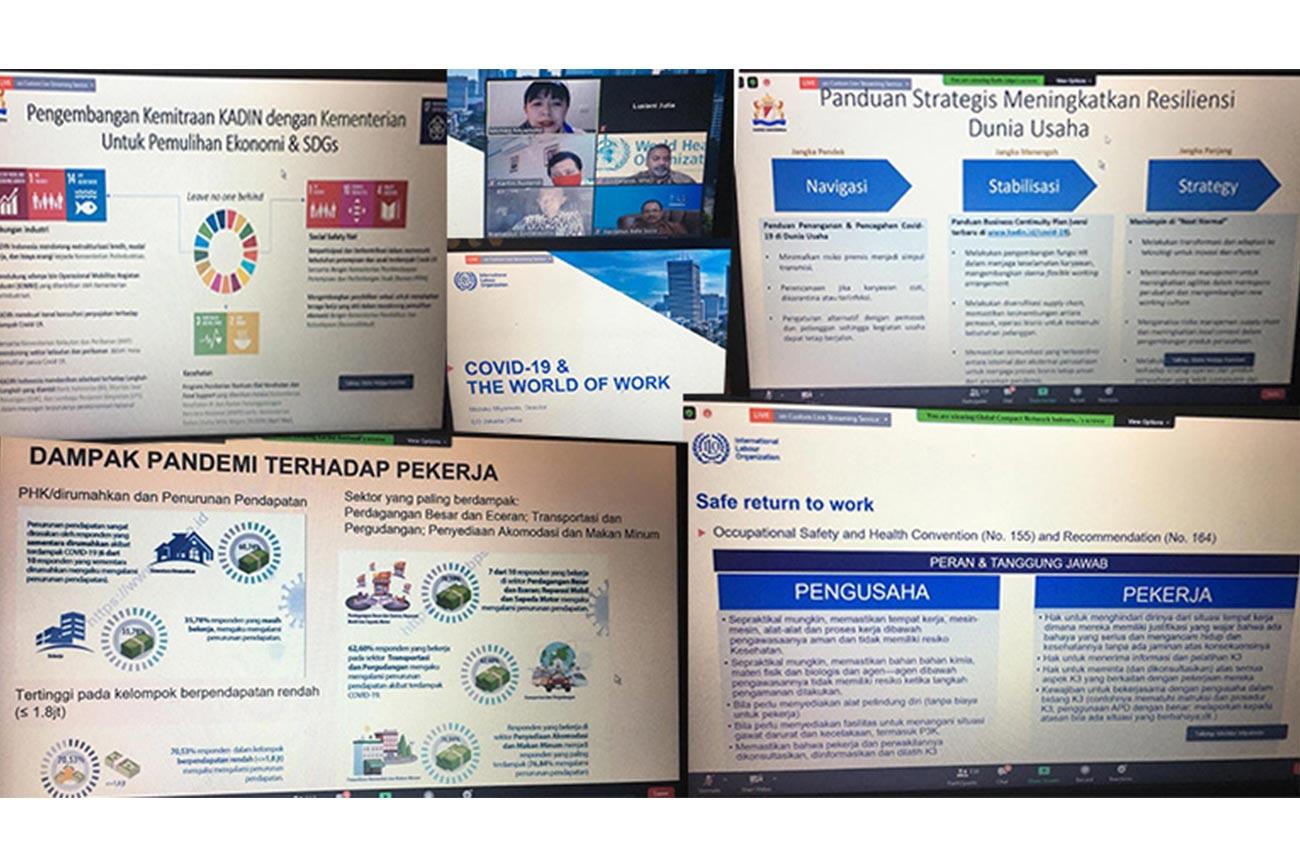Ensuring sustainable business operations for economic recovery in Indonesia

UN agencies in Indonesia team up to facilitate dialogues between government institutions and the private sector regarding new protocol guidelines to ensure sust
The ILO in collaboration with UNDP, Indonesia Global Compact Network (IGCN) and WHO conducted a series of joint workshop from July to August 2020 under the title: “Business Unusual in the New Normal in Four Industries: New Protocol Guidelines to Ensure Sustainable Operations.”
These series of webinars are aimed to facilitate dialogues among UN agencies, government institutions, business associations and private sector regarding needs, concerns and challenges for health, safety and environmental standards during the COVID-19 pandemic for business.
"We need to develop a working arrangement and make sure the application of paid leave so that sick workers would not force themselves to work and infect others. In addition, we need to develop an unemployment insurance mechanism that in the long run benefits both workers and employers should such crisis hit again. Said Michiko Miyamoto, Country Director of the ILO for Indonesia"
Marking the launch of the series of the webinar, the kick-off presented the head representatives of the ILO, UNDP and WHO, of the ministries of transportations and tourism & creative industry as well as of the business representatives from the Indonesian Chamber of Commerce and Industry (KADIN) and the Indonesian Employers’ Association (Apindo).
Michiko Miyamoto, Country Director of the ILO for Indonesia, highlighted the devastating impact of the pandemic to employment and business during the kick-off webinar dialogue on 22 July. The ILO’s latest monitor on COVID-19 and the world of work revealing the loss of working hours equivalent to 400 million full-time jobs, worsened compared to the previous estimation.
The pandemic has also disproportionately impacted women workers due to their over-representation in some of the economic sectors worst affected by the crisis, such as accommodation, retail, trade and manufacturing.
"To assist business cope with the impact of the pandemic, Kadin is actively supporting the COVID-19 taskforce, developed a guideline on health protocols for business and collaborated with relevant institutions. Said Shinta Widjaja Kamdani, Vice Chair of Kadin’s International Relations"
During the discussion, she reminded the importance of paid leave and unemployment insurance as means to help mitigating the infection among workers during the new normal era. “We need to develop a working arrangement and make sure the application of paid leave so that sick workers would not force themselves to work and infect others. In addition, we need to develop an unemployment insurance mechanism that in the long run benefits both workers and employers should such crisis hit again,” she said before more than 100 participants.
Meanwhile, Shinta Widjaja Kamdani, Vice Chair of Kadin’s International Relations, appreciated the efforts taken by the Indonesian government to sustain business operations. To assist business cope with the impact of the pandemic, Kadin is actively supporting the COVID-19 taskforce, developed a guideline on health protocols for business and collaborated with relevant institutions.
Specifically for the tourism sector, Maulana Yursran, Chair of Apindo for tourism and creative economy, said that the tourism sector is committed to adapt the health protocols and integrate them into their business operations. One of the tourism area that has shown its strong commitment is West Sumatra Province. “The Provincial Government of West Sumatra has applied testing and tracing mechanisms to boost its tourism sector. Safety and trust are key values for tourism sector,” he said.
The meeting was concluded with the key points that health protocols should be implemented as part of the economic recovery and business operations. Therefore, there is a need for a commitment to adapt these health protocols and to make them part of the daily new habits at the individual as well as the society levels.
The kick-off webinar will be continued with four series of webinars on specific industrial sectors as the following: Food industry, transportation (land, sea and air), mass gathering (event organizer and sports) as well as hotel and tourism. These four industries are selected due to their high risk, labour intensive and important roles in economic recovery.




